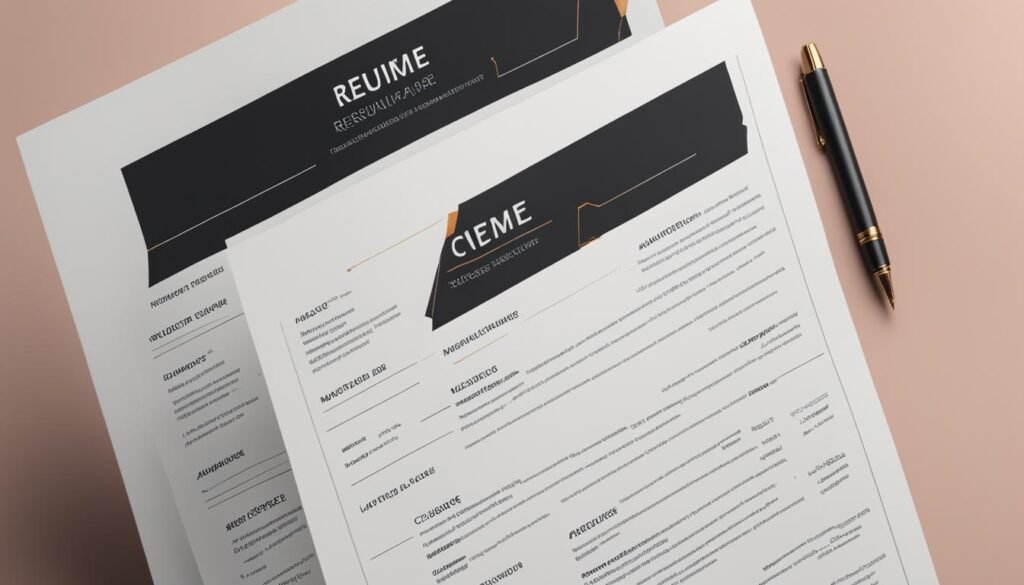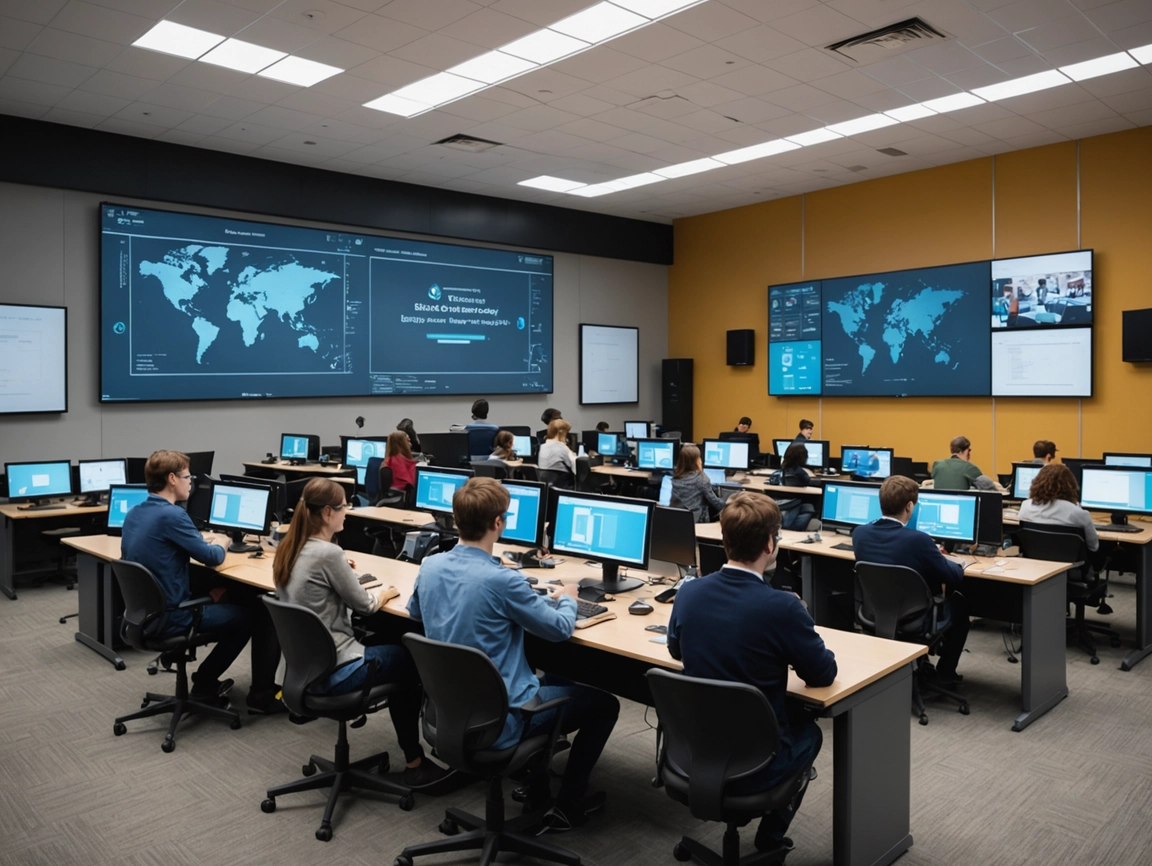When applying for internships in the Philippines, standing out from the competition is crucial. One effective way to do this is by tailoring your resume to the specific job requirements and industry you’re targeting. By optimizing your resume for internship applications, you can showcase your skills, education, and experience in a way that appeals to employers in the Philippines.
Key Takeaways:
- Tailor your resume to align with the job requirements and industry you’re targeting.
- Showcase your skills, education, and experience in a way that appeals to employers in the Philippines.
- Highlight relevant achievements and quantify your accomplishments whenever possible.
- Research the company and customize your resume to align with its values, goals, and culture.
- Utilize online tools like Zety and Behance to build a compelling and professional resume.
Understanding the Difference Between a Resume and a CV
When applying for internships in the Philippines, it’s crucial to understand the difference between a resume and a curriculum vitae (CV). While both documents provide information about your qualifications, they have distinct purposes and formats.
A resume is a concise document that highlights your work experience, education, and skills relevant to the job you’re applying for. It is typically limited to one to two pages, allowing you to present a clear and focused snapshot of your qualifications. Resumes are the preferred format for internship applications as they efficiently showcase your relevant attributes.
On the other hand, a curriculum vitae (CV) offers a comprehensive overview of your career, including your education, professional achievements, research, publications, and awards. Unlike a resume, a CV has no length limit and is often more detailed and extensive. CVs are commonly used in academic or research positions.
For internships, it’s important to tailor your application using a resume format. This allows you to highlight the most pertinent aspects of your qualifications and present them in a concise and impactful manner. While CVs may be more appropriate in certain industries or positions, a well-crafted resume is generally the best choice for internship applications in the Philippines.
To better understand the differences between a resume and a CV and choose the appropriate format for your internship application, let’s examine the components and best practices for creating an effective internship resume.
Image

Essential Tips for Creating Your Internship Resume
When it comes to creating your internship resume, it’s crucial to keep a few essential tips in mind. By following these guidelines, you can make sure that your resume stands out from the competition and increases your chances of landing your dream internship.
First and foremost, remember to keep your resume brief, concise, and easy to read. Employers often receive numerous applications, so it’s important to make a good first impression with a resume that is clear and to the point. Highlight only the information that is relevant to the specific job position you are applying for.
In order to tailor your resume effectively, take the time to research the specific job requirements and industries you are targeting. This will help you align your skills and experiences with what the employer is seeking. By showcasing how your qualifications closely match the needs of the internship, you demonstrate your suitability for the role.
Avoid including unnecessary personal information or details that are not related to the internship position. Stick to the relevant information that showcases your qualifications, skills, and experiences. This will help keep your resume focused and professional.
To further enhance your resume, consider including specific examples of your achievements and accomplishments. Quantify your achievements whenever possible to provide tangible evidence of your capabilities. This will give employers a clear understanding of your potential and what you can bring to the internship.
Remember, it’s important to tailor your internship resume to each specific job opportunity. Customize it to showcase your suitability for the role and your genuine interest in the company. By following these tips, you can create a compelling resume that increases your chances of securing the internship you desire.

Key Components of an Internship Resume
An effective internship resume consists of key components that provide a comprehensive view of your qualifications and suitability for the position. By including these components, you can present yourself as a strong candidate and increase your chances of securing your desired internship in the Philippines.
Contact Details
Start your resume with your contact details, including your full name, phone number, and professional email address. This information allows the employer to easily reach out to you for further communication.
Career Objective Statement
Create a career objective statement that outlines your professional goals and aspirations. Tailor this statement specifically to the internship you’re applying for, demonstrating your enthusiasm and commitment to the role and the company.
Educational Achievements
Highlight your educational background, including your degree, major, educational institution, and graduation date. Emphasize any honors, awards, or special recognition you have received during your academic journey.
Prominent Extracurricular Activities
Showcase your involvement in relevant extracurricular activities that demonstrate your leadership, teamwork, and initiative. This could include participation in clubs, organizations, community service, or sports teams.
Relevant Skills
Identify and include both hard skills and soft skills that are relevant to the internship position. Hard skills are specific technical or industry-related competencies, while soft skills encompass your interpersonal and communication abilities. Align these skills with the requirements outlined in the internship job description.
By incorporating these key components into your internship resume, you can create a well-rounded and compelling document that effectively presents your qualifications, experiences, and strengths. Remember to tailor your resume to each specific internship opportunity and highlight the achievements and experiences that are most relevant. Good luck with your internship applications!

Showcasing Your Achievements and Skills in Your Internship Resume
When it comes to securing an internship, your resume plays a crucial role in making a lasting impression on potential employers. To make your internship resume stand out from the rest, it’s important to showcase your achievements and skills in a compelling way.
One effective strategy is to highlight any notable accomplishments you’ve achieved, such as leadership roles, academic honors, or successful projects. This not only demonstrates your abilities but also shows your dedication and commitment to your work.
Quantifying your achievements whenever possible is another powerful way to make your resume shine. By providing tangible evidence of your capabilities, such as numbers, percentages, or tangible results, you can strengthen your resume and make it more compelling to employers. For example, instead of simply stating that you “led a team,” you could specify that you “successfully led a team of 10 individuals, resulting in a 20% increase in productivity.”
In addition to showcasing your achievements, it’s crucial to include both hard skills and soft skills in your internship resume. Hard skills refer to technical skills that are specific to the job or industry, while soft skills are transferable abilities that can be applied across various roles. By demonstrating a combination of both hard and soft skills, you can convey your well-rounded abilities and versatility as a candidate.
Remember to tailor your resume to the specific internship you’re applying for, aligning your achievements and skills with the requirements of the position. Companies are looking for candidates who not only have the necessary skills but also possess the drive and passion to succeed in their organization.
To further enhance the visual appeal and impact of your internship resume, include relevant images or graphics that support your achievements. For example, if you’ve completed a project or won an award, consider including a visually appealing image related to that achievement.
By showcasing your achievements and skills in a compelling and visually appealing way, you can create an internship resume that stands out and increases your chances of securing the internship opportunity you’ve been dreaming of.

Optimizing Your Internship Resume for the Company
When applying for an internship, it’s important to optimize your resume specifically for the company you’re targeting. By tailoring your resume to align with the company’s values, goals, and culture, you can significantly increase your chances of standing out from other applicants and securing the internship opportunity.
Start by conducting thorough research on the organization. Understand their mission, vision, and the industry they operate in. Take note of any specific skills, experiences, or qualifications they prioritize in their job postings. This information will help you customize your resume accordingly.
Highlight experiences and skills that are most relevant to the internship position you’re applying for. Focus on showcasing achievements that demonstrate your ability to contribute to the company’s success. Quantify your accomplishments whenever possible to provide tangible evidence of your capabilities.
Customize your career objective statement to reflect your enthusiasm for the company and how your skills can be an asset to their organization. Personalize your resume to establish a connection with the employer and show your genuine interest in the internship opportunity.
Remember to review and update your resume for each company you apply to. Tailoring your resume to align with the specific requirements and preferences of each organization will make a significant difference in catching the employer’s attention.
By following these strategies, you can optimize your resume for the company and increase your chances of securing an internship that aligns with your career goals. Remember, personalized resumes that highlight your suitability for the role and genuine interest in the company will make you stand out from the competition.
Using Online Tools for Resume Building
When it comes to building your internship resume, leveraging online tools can make the process easier and more efficient. With a wide range of platforms available, you can take advantage of their features to create a standout resume that showcases your skills and qualifications. Two popular online tools for resume building are Zety and Behance.
Zety offers a variety of professionally designed resume templates that can be customized to match your preferences and the specific requirements of the job application. Their user-friendly interface allows you to easily input your information, choose a layout, and create a visually appealing resume that captures the attention of potential employers.
Additionally, Zety provides expert advice and job application tips to help you craft a compelling resume. Their resources can guide you on how to highlight your key strengths, tailor your resume for specific industries, and present your experience and skills effectively.
Behance, on the other hand, is a platform that allows you to create an online portfolio to showcase your best projects and creative work. While a traditional resume focuses more on text, an online portfolio can provide a visual representation of your skills and talents. Including a link to your Behance portfolio in your resume can enhance your application and leave a lasting impression on employers.
By utilizing these online tools for resume building, you can create a professional and visually appealing resume that sets you apart from other candidates. Take advantage of the features, templates, and resources offered by Zety and Behance to optimize your internship application and increase your chances of landing your desired internship in the Philippines.
Conclusion
Tailoring your resume for internship applications in the Philippines is crucial to increase your chances of securing the internship opportunity you desire. By following the tips and guidelines provided in this article, you can create a compelling and optimized resume that effectively showcases your qualifications, skills, and achievements. Remember to customize your resume for each internship application, highlighting your suitability for the specific role and demonstrating your genuine interest in the company.
When tailoring your resume, focus on including relevant information that aligns with the job requirements and the industry you’re targeting. Be concise and highlight your key accomplishments and experiences to capture the attention of potential employers. Additionally, make sure to quantify your achievements whenever possible to provide concrete evidence of your capabilities.
Utilize online tools like Zety to access a wide range of customizable resume templates and expert advice that can help you craft a compelling resume. Platforms like Behance can also be useful for creating an online portfolio to showcase your best projects and creative work, giving your internship application an extra edge.
By tailoring your resume effectively and presenting yourself as the ideal candidate, you can greatly increase your chances of standing out among other applicants and securing the internship position you desire. Good luck with your internship applications in the Philippines!


